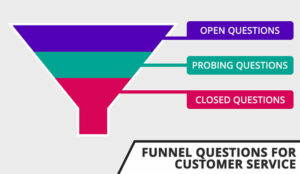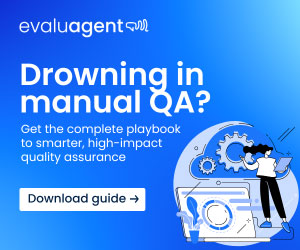Question: What kind of questions should I ask when interviewing potential agents for an inbound sales call centre environment?
Bearing in mind that I’m trying to find people who are sales oriented, should I focus on their sales technique or also try to ascertain their general customer service skills?
Is there any way of bringing these two together in a simple set of open-ended questions? And what kind of responses should I look for from ideal candidates?
ANSWER 1:
At Blue Sky we believe the recruitment process should be part of a big picture HR strategy, which is all glued together by a competency framework. The role you are recruiting for should have a job description, clearly linked to the competencies that are required to be successful in that role and the brand values of your organisation.
If you already have a competency framework in place, and job descriptions that use these competencies, then it should be straightforward to design a ‘competency-based interview’. This will help draw out real examples of specific behaviours being used successfully by the candidate that are likely to be repeated in the future.
So what competencies should you be looking for? The type of role you have described is what I would call a ‘sales through service’ role. These days, sales should be intrinsically linked to service.
While the knowledge and skills of ‘sales through service’ can be trained and coached, finding people with the right mindset and the underlying behaviours is crucial when recruiting. And this is where competency based interviewing comes in.
The type of competencies I would expect to be looking for are: sales ability, customer focus, communication, drive for achievement and, potentially, team working.
Each competency should have a clear definition and a list of behaviour indicators to guide you when assessing candidates and designing questions.
Let me give you an example:
Competency:
Sales ability
Definition:
To explore, discover and recognise customer requirements and match these with appropriate offerings, maximising all opportunities.
Behavioural Indicators:
- Builds rapport, using techniques such as exchanging and using names, finding areas of common ground.
- Establishes individual’s needs
- Demonstrates questioning techniques and listening skills
- Matches solutions
- Sells benefits
- Closes the sale
- Overcomes objections
Once you have built up this type of competency framework, designing the questions to ask becomes easy.
For ‘sales ability’ I would ask: “Think of a specific occasion when you showed successful sales ability and tell me about it”.
To probe further, I would use follow-up questions such as: “What skills were you using?”, “What was it about the way you acted that made it successful?”, “What was it about the occasion that you enjoyed?” and “What would you do differently next time?”
In terms of combining the sales and service elements of the role, one of the important things to discover through your recruitment process is how the candidate feels about targets, as I am guessing they are key to being successful. That is why a competency such as ‘drive for achievement’ should also be tested.
I would ask: “Tell me about a specific time when you were driven to achieve a target or goal”. And probing follow-up questions such as: “What motivated you to achieve this target?”
Personally, I would not just rely on interview questions. They may be good at talking the talk, but how good are they at walking the walk? As part of the recruitment process I would include a demonstration. Give them a brief, some time to prepare, and then get them to show you what they can do through a role-play of a typical customer scenario.
Lastly, I think it is really important to set very clear expectations about the role. It will be a waste of everyone’s time if they start the job and only want to do service not sales.
Contributed by: Clare Hollett, Managing Consultant at Blue Sky Consulting
ANSWER 2:
Firstly, look at your business, its culture and what it is you’re trying to sell – a product or a service? Something targeted to a very discrete group or more mainstream? How complex is it? What about the team itself? Are you looking to create a new team, or boost an existing one? All of this will affect the criteria you set out to fulfil at the start.
Always pre-qualify prospects, by telephone, to get a feel for their personality and aptitude for the role on offer. Cover the basics, such as asking whether candidates are prepared to work flexible hours and/or shift patterns and get a snapshot view of their experience to date.
These questions are important and can provide an instant ‘get out’. For instance, people may not be able to manage certain shift patterns, or you may want someone with more than two years’ experience. (Remember to use this information to create your own database; a candidate may not fit the bill this time, but may be worth revisiting another time.)
Use open-ended questions to allow candidates to express themselves freely and naturally. Note their confidence, how freely conversation flows, how enquiring they are, language used, humour, tone and so on.
Asking candidates what they feel has made them successful also allows you to encapsulate their own measures of success against your own. Successfully matching candidates to employers requires many ticks in many boxes, but a critical one is that of cultural fit. Use the pre-qualifying round to generate an impression of how close this may be.
Successful candidates should then be invited to carry on with the interview. This next stage needs to cover basic skills and aptitude and should similarly use a mix of open and closed questions.
Test basic mental arithmetic and verbal skills by presenting problems; assess motivation by asking candidates’ reactions to certain scenarios, and similarly use scenarios and role-play to gauge teamwork skills and personality. What are you looking for here? You’ll want to see evidence of:
- Strong verbal communications (clear pronunciation, no unnecessary pauses)
- Strong listening skills (focus, understanding customer needs)
- Good humour (amenable, pleasant, coping under pressure, consistent)
- Strong motivation and energy
- Displays of initiative
- Integrity (honesty, good humoured)
Does the candidate have the right personality for the role in question? (For example, do you want individuals who are bubbly, energetic? Or are you looking for more sober, ‘straight-laced’ characters?)
Finally, should there be a divide between sales and customer service? Providing excellent customer service has to be at the heart of any successful organisation and inherently part of any successful sales strategy. Proven sales ability is important, and this can be covered by experience to date.
In my view, the questions posed here and in this way should leave a very sound impression of candidates’ propensity to sell and the manner in which they do it. It’s a careful balance to achieve, but one that a sound recruitment strategy should help you realise.
Contributed by: Steve Usher, Director at recruitment firm Call Centre Associates
ANSWER 3:
In truth you need to look for both, as a balance of customer service and the desire and ability to work in a target-orientated environment is essential. Having good customer service without the necessary sales drive will be as detrimental to business as having a hard sales person who has no service focus.
I would advise following a competency based interview structure that pulls out the key criteria that you would need to identify, for example: communication skills, customer focus, flexibility, results orientation, ability to influence, and decision making.
The following are example questions and the key indicators of a positive response:
Communication Skills
Question: Tell me about a time you have explained or described a product, service or concept to somebody that was struggling to understand.
Positive Indicators:
- Engages audience and is able to effectively communicate complex information and ideas.
- Speech is concise, clear and fluent. Talks confidently and uses examples if relevant to support dialogue
- Listens attentively, asks questions and encourages participation to enhance understanding when necessary and build rapport
Customer Focus
Question: Tell me about a time you have gone the extra mile for a customer.
Positive Indicators:
- Strives to anticipate, identify, and understand a customer’s wants needs and concerns
- Builds an effective relationship through appropriate questioning and listening, responding accordingly
- Meets customer deadlines
Flexibility
Question: Talk me through a time when changes at work or in education have affected the way you normally do things. How did you feel about the changes? What did you do differently? What was the outcome of the change?
Positive Indicators:
- Positive attitude to change
- Works to enhance the change by working with movement rather than against it
- Ability to adapt accordingly
- Sees the bigger picture within business or team and responds positively
Results Orientation
Question: Talk me through a time when you worked hard to achieve a personal goal. What challenges did you face? How did you tackle those challenges? What was the outcome? How did that make you feel?
Positive Indicators:
- Is aware of what motivates and de-motivates them
- Strives to and regularly exceeds goals and targets
- Makes changes in methods of work to improve results
- Has a positive and energetic outlook
- Is resilient and regularly works outside of their ‘comfort zone’
- Is good at finding solutions to problems
Ability to Influence
Question: Talk me through a time when you have had to influence others.
Positive Indicators:
- Is excited by new challenges
- Builds relationships with others to gain support
- Enters in to negotiations willingly and demonstrates examples of achieving ‘win win’ outcomes through their negotiating skills
- Adapts their influencing style to the audience or subject matter
- Makes their point and gains agreement or accepts a compromise in a non-confrontational manner
Decision Making
Question: Tell me about a time when you have had to make a difficult decision at work without the help of a colleague or manager.
Positive Indicators:
- Attitude to empowerment is positive
- Remains calm under pressure and has the ability to stay focused
- Confident in decision because has weighed up all factors in reaching conclusion
This is a good summary of both some questions and the likely responses you should look for.
Contributed by: Paul Marriott, Managing Director at recruitment firm Hays Contact Centres
For more advice on interviews and careers in your contact centre, read these articles next:
- How to Define Career Paths in Your Contact Centre
- Interview Question: Do You Have Experience Working Towards Targets and KPIs
- Top 50 Customer Service Interview Questions – with Sample Answers
Author: Jonty Pearce
Reviewed by: Robyn Coppell
Published On: 2nd Aug 2007 - Last modified: 4th Sep 2025
Read more about - Call Centre Management, Call Centre Answers, Career, Jobs, Management Strategies, Recruitment and HR, Telesales















